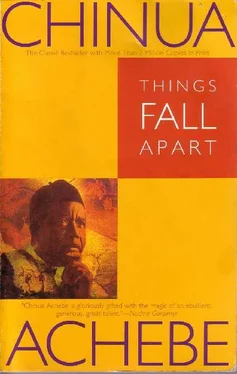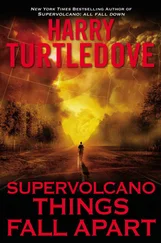Chinua Achebe - Things Fall Apart
Здесь есть возможность читать онлайн «Chinua Achebe - Things Fall Apart» весь текст электронной книги совершенно бесплатно (целиком полную версию без сокращений). В некоторых случаях можно слушать аудио, скачать через торрент в формате fb2 и присутствует краткое содержание. Город: New York, Год выпуска: 1994, Издательство: A DIVISION OF RANDOM HOUSE, INC., Жанр: Контркультура, на английском языке. Описание произведения, (предисловие) а так же отзывы посетителей доступны на портале библиотеки ЛибКат.
- Название:Things Fall Apart
- Автор:
- Издательство:A DIVISION OF RANDOM HOUSE, INC.
- Жанр:
- Год:1994
- Город:New York
- ISBN:нет данных
- Рейтинг книги:2 / 5. Голосов: 2
-
Избранное:Добавить в избранное
- Отзывы:
-
Ваша оценка:
- 40
- 1
- 2
- 3
- 4
- 5
Things Fall Apart: краткое содержание, описание и аннотация
Предлагаем к чтению аннотацию, описание, краткое содержание или предисловие (зависит от того, что написал сам автор книги «Things Fall Apart»). Если вы не нашли необходимую информацию о книге — напишите в комментариях, мы постараемся отыскать её.
—W. B. Yeats, "The Second Coming"
Things Fall Apart — читать онлайн бесплатно полную книгу (весь текст) целиком
Ниже представлен текст книги, разбитый по страницам. Система сохранения места последней прочитанной страницы, позволяет с удобством читать онлайн бесплатно книгу «Things Fall Apart», без необходимости каждый раз заново искать на чём Вы остановились. Поставьте закладку, и сможете в любой момент перейти на страницу, на которой закончили чтение.
Интервал:
Закладка:
"During the last planting season a white man had appeared in their clan."
"An albino," suggested Okonkwo.
"He was not an albino. He was quite different." He sipped his wine. "And he was riding an iron horse. The first people who saw him ran away, but he stood beckoning to them. In the end the fearless ones went near and even touched him. The elders consulted their Oracle and it told them that the strange man would break their clan and spread destruction among them." Obierika again drank a little of his wine. "And so they killed the white man and tied his iron horse to their sacred tree because it looked as if it would run away to call the man's friends. I forgot to tell you another thing which the Oracle said. It said that other white men were on their way.
They were locusts, it said, and that first man was their harbinger sent to explore the terrain. And so they killed him."
"What did the white man say before they killed him?" asked Uchendu.
"He said nothing," answered one of Obierika's companions.
"He said something, only they did not understand him," said Obierika. "He seemed to speak through his nose."
"One of the men told me," said Obierika's other companion, "that he repeated over and over again a word that resembled Mbaino. Perhaps he had been going to Mbaino and had lost his way."
"Anyway," resumed Obierika, "they killed him and tied up his iron horse. This was before the planting season began. For a long time nothing happened. The rains had come and yams had been sown. The iron horse was still tied to the sacred silk-cotton tree. And then one morning three white men led by a band of ordinary men like us came to the clan. They saw the iron horse and went away again. Most of the men and women of Abame had gone to their farms. Only a lew of them saw these white men and their followers. For many market weeks nothing else happened. They have a big market in Abame on every other Afo day and, as you know, the whole clan gathers there. That was the day it happened. The three white men and a very large number of other men surrounded the market. They must have used a powerful medicine to make themselves invisible until the market was full. And they began to shoot. Everybody was killed, except the old and the sick who were at home and a handful of men and women whose cbi were wide awake and brought them out of that market." He paused.
"Their clan is now completely empty. Even the sacred fish in their mysterious lake have fled and the lake has turned the color of blood. A great evil has come upon their land as the Oracle had warned."
There was a long silence. Uchendu ground his teeth together audibly. Then he burst out:
"Never kill a man who says nothing. Those men of Abame were fools. What did they know about the man?" He ground his teeth again and told a story to illustrate his point. "Mother Kite once sent her daughter to bring food. She went, and brought back a duckling. 'You have done very well,' said Mother Kite to her daughter, 'but tell me, what did the mother of this duckling say when you swooped and carried its child away?' 'It said nothing,' replied the young kite. 'It just walked away.' 'You must return the duckling,' said Mother Kite. 'There is something ominous behind the silence.' And so Daughter Kite returned the duckling and took a chick instead. 'What did the mother of this chick do?' asked the old kite. 'It cried and raved and cursed me,' said the young kite. 'Then we can eat the chick,' said her mother. 'There is nothing to fear from someone who shouts.' Those men of Abame were fools."
"They were fools," said Okonkwo after a pause. "They had been warned that danger was ahead. They should have-armed themselves with their guns and their machetes even when they went to market."
"They have paid for their foolishness," said Obierika, "But I am greatly afraid. We have heard stories about white men who made the powerful guns and the strong drinks and took slaves away across the seas, but no one thought the stories were true."
"There is no story that is not true," said Uchendu. "The world has no end, and what is good among one people is an abomination with others. We have albinos among us. Do you not think that they came to our clan by mistake, that they have strayed from their way to a land where everybody is like them?"
Okonkwo's first wife soon finished her cooking and set before their guests a big meal of pounded yams and bitter-leaf soup. Okonkwo's son, Nwoye, brought in a pot of sweet wine tapped from the raffia palm.
"You are a big man now," Obierika said to Nwoye. "Your Iriend Anene asked me to greet you."
"Is he well?" asked Nwoye.
"We are all well," said Obierika.
Ezinma brought them a bowl of water with which to wash their hands. After that they began to eat and to drink I he wine.
"When did you set out from home?" asked Okonkwo.
"We had meant to set out from my house before cockcrow," said Obierika. "But Nweke did not appear until it was quite light. Never make an early morning appointment with a man who has just married a new wife." They all laughed.
"Has Nweke married a wife?" asked Okonkwo.
Oainua Ackefce
"He has married Okadigbo's second daughter," said Obierika.
"That is very good," said Okonkwo. "I do not blame you for not hearing the cock crow."
When they had eaten, Obierika pointed at the two heavy bags.
"That is the money from your yams," he said. "I sold the big ones as soon as you left. Later on I sold some of the seed-yams and gave out others to sharecroppers. I shall do that every year until you return. But 1 thought you would need the money now and so I brought it. Who knows what may happen tomorrow? Perhaps green men will come to our clan and shoot us."
"God will not permit it," said Okonkwo. "1 do not know how to thank you."
"I can tell you," said Obierika. "Kill one of your sons for me.
"That will not be enough," said Okonkwo.
"Then kill yourself," said Obierika.
"Forgive me," said Okonkwo, smiling. "I shall not talk about thanking you any more."
CHAPTER SIXTEEN
When nearly two years later Obierika paid an il •'• other visit to his friend in exile the circum stances were less happy. The missionaries had come to Umuofia. They had built their church there, won a handful of converts and were already sending evangelists to the surrounding towns and villages. That was a source of great sorrow to the leaders of the clan,– but many of them believed that ihe strange faith and the white man's god would not last. None of his converts was a man whose word was heeded in ihe assembly of the people. None of them was a man of title. They were mostly the kind of people that were called efuleju , worthless, empty men. The imagery of an efulefu in the language of the clan was a man who sold his machete and wore (lie sheath to battle. Chielo, the priestess of Agbala, called the converts the excrement of the clan, and the new faith was a mad dog that had come to eat it up.
What moved Obierika to visit Okonkwo was the sudden appearance of the latter's son, Nwoye, among the missionaries ID Umuofia.
"What are you doing here?" Obierika had asked when after many difficulties the missionaries had allowed him to speak to the boy.
"1 am one of them," replied Nwoye.
"How is your father?" Obierika asked, not knowing what else to say.
"1 don't know. He is not my father," said Nwoye, unhappily.
And so Obierika went to Mbanta to see his friend. And he found that Okonkwo did not wish to speak about Nwoye. It was only from Nwoye's mother that he heard scraps of the story.
The arrival of the missionaries had caused a considerable stir in the village of Mbanta. There were six of them and one-was a white man. Every man and woman came out to see th< white man. Stories about these strange men had grown sim <���• one of them had been killed in Abame and his iron horse tied to the sacred silk-cotton tree. And so everybody came to see the white man. It was the time of the year when everybody was at home. The harvest was over.
Читать дальшеИнтервал:
Закладка:
Похожие книги на «Things Fall Apart»
Представляем Вашему вниманию похожие книги на «Things Fall Apart» списком для выбора. Мы отобрали схожую по названию и смыслу литературу в надежде предоставить читателям больше вариантов отыскать новые, интересные, ещё непрочитанные произведения.
Обсуждение, отзывы о книге «Things Fall Apart» и просто собственные мнения читателей. Оставьте ваши комментарии, напишите, что Вы думаете о произведении, его смысле или главных героях. Укажите что конкретно понравилось, а что нет, и почему Вы так считаете.












